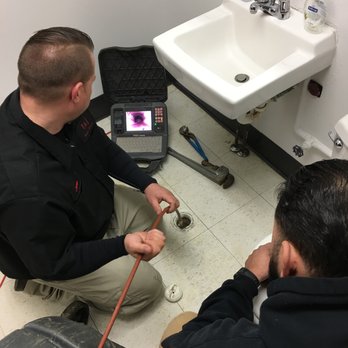
There is a booming demand for electricians and the government is looking to train future electricians. The government has created a program to meet this demand. The demand for electricians is expected to continue in 2021. This will ensure that salaries are high.
Electricians' job prospects
You will be an electrician and specialize in wiring buildings, transmission lines, stationary equipment, and other electrical devices. In addition, you'll be involved in the installation of new components and equipment and the maintenance of existing electrical infrastructure. So, there are many opportunities for you to work.
The demand for electricity is increasing, which is driving the demand for electricians. According to the United States Bureau of Labor Statistics, electricians will see a 11% increase over the next eight year. This is a substantial rise and is expected to create more than 84 700 new jobs by 2024. This increase in demand is driven by increased demand for wiring in commercial buildings and homes.

Chances for advancement
The growing and rewarding industry of electricians has a high demand. There are several routes to the ideal electrician job, including apprenticeships and certifications. These specialized fields offer high pay and perks along with career growth and advancement possibilities.
The job of an electrical installer is to install electric in residential, commercial and industrial buildings. They learn how to read blueprints, provide cost estimates, troubleshoot wiring, and interact with other tradesmen on a professional level. After successfully completing the certificate program, a Journeyman Electrician can apply for an apprenticeship that will lead to a more senior position. Apprenticeships last for about 4-5 years, although some employers accept credits from associate degrees.
To become an electrician, you will need to have the following requirements
These are the prerequisites for becoming an electrician. Most states require high school students to have completed at least one year of algebra. An electrician must also have an understanding of physics, and physical science. If you have these qualifications, you should have no problem starting your apprenticeship in this field.
Apprenticeships. To become an electrician you will need to do a four-to five-year apprenticeship with a master electrician. During this time, you will be exposed to all aspects and gain valuable experience. You will also need to pass a written exam that is based on the National Electrical Code. You will be licensed as an electrician eventually and be able manage your own projects.

Salaries for electricians
There are many salaries for electricians in the United States. The lowest-paid electricians are found in rural areas, while those who make the most living in the cities live in the richest areas. This can cause problems for electricians who may struggle to find qualified employees or fear they will move to another area to make more.
Based on your experience level and geographic location, the salary of an electrician can vary widely. For example, electricians in St. Albans, Vermont, make around $63,768 per year. Some areas have salaries that can exceed $71,031 For this reason, it is important to get several estimates when hiring an electrician. A contract should be included in the quotes. It should include both labor and material costs.
FAQ
Are there any additional things I need to consider?
Yes. Check your local laws to see what types of projects are allowed and what conditions must be met. Some states require that you get council approval before you build. Other states say that you only need to notify them of your plans. For more information, consult your local authorities.
When do I have the obligation to pay for the service/contractor
The type and amount of the service will affect the payment schedule. A contractor might hire to install a roof. You would usually pay when the work is complete. If you purchase a product, such a cooker for your kitchen, from a supplier you might only make payments after it has been tested and received.
What is the purpose and scope of the service agreement
A Service Agreement defines the terms by which a customer agrees that they will buy goods from your company. It also describes how you will offer those services to them as payment.
The most common type of such document is the Sales Order Form. This is where you state what products are being purchased by the customer and at what price. You then list any other items included in the order, such as delivery charges, VAT, insurance, etc. Finally, you will specify when the order should delivery and be paid for.
Depending on the nature and purpose of the transaction, it is possible to use another document.
An invoice may be used if you provide a service and not a product.
If you are buying something from another person, you would likely use a Purchase Order Form.
It is important to include all required information when drafting a sale order form.
Remember: The more detailed your sales order form is, the easier it will be for the buyer to understand.
How do I obtain a service-contract agreement?
You can request a standard SCA form from your local government. Alternatively, you could use our online quote generator to find out more information about your requirements and then send us your details so we can contact you with further information.
Do I require a legal representative in order to sign my Service Agreements
No. You don't need a legal representative to sign your service agreements. As a precaution, however, it is a good idea to appoint one.
Legal representatives are people who act on behalf of another person. If you are a contractor, it may be a good idea to appoint someone you trust to represent you.
This could mean hiring a solicitor or accountant. You could also appoint someone to take care of your business interests.
In most cases, the client is responsible for appointing a legal agent. Sometimes, however, the vendor may hire a legal representative.
In either case, having a legal representative means you are protected legally.
Statistics
- (1) Except as provided in paragraphs (a)(4) and (a)(8) of this section, if the estimated amount of the contract or subcontract is $10 million or more, the contracting officer shall request clearance from the appropriate OFCCP regional office before- (acquisition.gov)
- While we offer all our high-quality services at competitive prices, we know that many who need our services are on fixed incomes, so we offer a 10 percent discount for seniors and military members. (homeservicecontractorsinc.com)
- Depending on the client's trustworthiness and financial stability, a deposit is usually 10 to 50% of the total contract amount. (lawdepot.com)
- (3) The contracting officer may provide for a contract price adjustment based solely on a percentage rate determined by the contracting officer using a published economic indicator incorporated into the solicitation and resulting contract. (acquisition.gov)
- (ii) Name, address, and telephone number of each proposed first-tier subcontractor with a proposed subcontract estimated at $10 million or more. (acquisition.gov)
External Links
How To
What should a service contract include?
A Service Agreement (SA) is essential to any business relationship. It will outline what you expect and how it will be achieved. The SA also describes when and how you expect the other side to meet its contractual obligations.
Here are the essential elements to a successful SA
-
The scope of work and services required by both parties.
-
Payment terms details, including start date and expiration dates for goods/services.
-
The project price must be agreed.
-
Any additional costs like VAT etc.
-
If there are any other issues that need to be addressed.
-
Who will be held responsible for any problems that may arise on the job?
-
How disputes will be resolved.
-
What happens if a party breaches the contract.
-
What happens when there is a disagreement?
-
When does the contract come into effect?
-
What happens if one party fails to perform?
-
How long will it take to pay invoices
-
Who pays for travel expenses?
-
Where the money comes.
-
What happens if a client changes mind about the project?
-
What happens if the supplier isn't there?
-
Who is allowed to access the site during construction
-
What happens if the customer cancels the project.
-
What happens if the product malfunctions?
-
What happens if a manufacturer refuses to provide parts?
-
What happens if your equipment breaks down?
-
What happens when the project takes longer to complete?
-
What happens if the work isn’t completed within the stipulated time?
-
What happens if the project is not up to standard?
-
What happens if the cost exceeds?
-
What happens if materials are not delivered on time?
-
What happens if the material arrives broken?
-
What happens if the products aren't up to standard?
-
What happens if the job has to be canceled?
-
What happens if the business goes under?